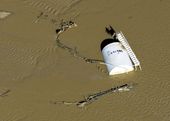Environment
Latest Stories

575472fad9b0c80a4e0f6a706700d0fb.jpg
In this Thursday, March 13, 2014 photo provided by China's Xinhua News Agency, China's rescue ships sail different ways as they conduct a search operation for a missing Malaysia Airlines Boeing 777, flight MH370. China has the most at stake and has been taking an unusually high-profile role. Almost immediately after the plane disappeared, Beijing dispatched its largest-ever rescue flotilla to the initial search area in the South China Sea, which Beijing considers its own backyard. (AP Photo/Xinhua, Zhao Yingquan) NO SALES

3_172014_begich8201.jpg
Walking a tightrope: Sen. Mark Begich is facing fights over environmental issues in his re-election bid as he tries to balance Democratic ideals with energy development in a conservative state. (Associated Press)

9c7661bdb80ebc0a4e0f6a70670003d0.jpg
File - In this Sept. 17, 2013, file photo, a crude oil storage tank lies on its side in flood water along the South Platte River in Weld County, Colo. Denver-based Zavanna LLC oil company probably will be sanctioned for not heeding a warning to properly secure a North Dakota well that was swamped by floodwaters and spilled oil near the confluence of the Yellowstone and Missouri rivers, a state health official said Monday, March 17, 2014. (AP Photo/John Wark, File)

e59a132ab798ba0a4e0f6a7067008bdd.jpg
FILE - In this Aug. 16, 2013 file photo, North Carolina Gov. Pat McCrory speaks during a news conference at the East Carolina School of Dental Medicine in Greenville, N.C. Documents and interviews collected by The Associated Press show how Duke’s lobbyists prodded Republican legislators to tuck a 330-word provision in a regulatory reform bill running nearly 60 single-spaced pages. Though the bill never once mentions coal ash, the change allowed Duke to avoid any costly cleanup of contaminated groundwater leaching from its unlined dumps toward rivers, lakes and the drinking wells of nearby homeowners. Passed overwhelmingly by the GOP-controlled legislature, the bill was signed into law by Gov. Pat McCrory, a pro-business Republican who worked at Duke for 28 years. (AP Photo/The Daily Reflector, Rhett Butler)

d8ba5c51b797ba0a4e0f6a706700e00a.jpg
FILE - In this Feb. 19, 2014 file photo, girls play on a soccer field near the L.V. Sutton Complex operated by Duke Energy in Wilmington, N.C. Documents and interviews collected by The Associated Press show how Duke’s lobbyists prodded Republican legislators to tuck a 330-word provision in a regulatory reform bill running nearly 60 single-spaced pages. Though the bill never once mentions coal ash, the change allowed Duke to avoid any costly cleanup of contaminated groundwater leaching from its unlined dumps toward rivers, lakes and the drinking wells of nearby homeowners. (AP Photo/Randall Hill, File)

00e9278eb797ba0a4e0f6a7067005416.jpg
FILE - In this Feb. 5, 2014 file photo, Didi Fung, a contractor for the Environmental Protection Agency, collects water samples from the Dan River as state and federal environmental officials continued their investigations of a spill of coal ash into the Dan River in Eden, N.C. Documents and interviews collected by The Associated Press show how Duke’s lobbyists prodded Republican legislators to tuck a 330-word provision in a regulatory reform bill running nearly 60 single-spaced pages. Though the bill never once mentions coal ash, the change allowed Duke to avoid any costly cleanup of contaminated groundwater leaching from its unlined dumps toward rivers, lakes and the drinking wells of nearby homeowners. (AP Photo/Gerry Broome, File)


